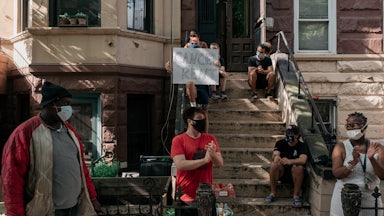In early February, Texas state Representative Shelby Slawson filed a bill in the state legislature that would prevent local governments from enforcing any eviction protections such as those adopted at the height of the Covid-19 pandemic—up to and including free legal aid programs or temporary pauses in the case of a natural disaster or other emergency. Texas is already regarded as a landlord-friendly state, but this bill’s broad language would shift the balance considerably by making it even easier for landlords to remove people from their homes. Slawson’s bill stalled in committee, but an identical version filed in the state Senate by Brandon Creighton, who represents much of Montgomery County, north of Houston, recently passed in the Senate with no amendments. Now it’s back in the House, closer to becoming law.
Both Slawson—of the small town of Stephenville, southwest of the Dallas-Fort Worth area—and Creighton hold reputations as the “most conservative” members of their respective chambers. (Slawson is likely better known to some as the author of the 2021 Texas Heartbeat Act, which prohibited abortions in the state after just six weeks.) They have each received cash from real estate donors, including the Texas Apartment Association PAC, which hopes the bill will clarify that “cities cannot impede the eviction process.” But their involvement in this matter may not merely be rooted in run-of-the-mill ideological leanings. In what some advocates have told me clearly amounts to a conflict of interest, both Slawson and Creighton also draw thousands of dollars of their own wealth from real estate.
Creighton is the owner of Creighton Realty Partners, a company that lists 31 properties in or around Montgomery County, selling and renting for a combined total of around $77 million. Slawson is herself a landlord who, before a divorce in 2021, co-owned or managed at least 16 properties in the Stephenville area with a market value of about $3.2 million, according to the most recent Redfin and Zillow estimates. Today, property records show Slawson holds the deeds for at least seven Stephenville properties, with a market value of around $1.9 million.
The New Republic reached out to Slawson’s and Creighton’s offices by phone and by email for comment, but neither replied.
The bill—H.B. 2035 in the House; S.B. 986 in the Senate—outlaws local governments from adopting “any ordinance, order, or other measure” that “prohibits, restricts, or delays” the delivery of a notice to vacate, which kick-starts the eviction process.
Neither Slawson nor Creighton appears to own property in Houston or Dallas proper, but they have demonstrated a keen interest in strengthening local landlords’ vice grip on tenants’ livelihoods. Their move to strike eviction protections, even in the case of an emergency, follows a trend among other states that saw life-changing funding for eviction diversion programs and tenant protections during the pandemic, only for many of those gains to evaporate as soon as the coast was deemed clear.
In New York, landlords have crusaded, with the help of millions of dollars, against anti-eviction legislation. In California, Ohio, and Florida, realtors’ associations have worked together to block rent control and stabilization measures. If, as activists have noted, the 2020 protests after the death of George Floyd sparked a reactionary backlash, so too have landlords—and lawmakers, and sometimes landlord-lawmakers—begun to respond to tenants’ historic movement for a greater say in how they live.
Of all the cities tracked by Eviction Lab, Houston and Dallas hold the second- and fifth-highest spots for eviction filings during the pandemic, as the Centers for Disease Control and Prevention eviction moratorium went largely unenforced. Many Austin tenants were saved by a strong local eviction moratorium—the kind Slawson and Creighton’s bill outlaws—but it expired in November 2022. Since then, Austin and Dallas have already hit pre-pandemic eviction filing levels, while evictions in Houston have reached a historic high. On the week of April 17, 2023, there were nearly 2,000 eviction cases filed in Harris County, where Houston is located; in the Dallas-Fort Worth area, cases hover just under 1,000.
There are many so-called “risk factors” for evictions. If you are a tenant with a child, for instance, you are statistically more likely to get evicted. If you have health problems and go to the hospital, that’s another risk factor. Black women have a higher probability of facing eviction, due partly to disparities in wages and employment. And once evicted, in Texas, your name can be placed on a blacklist, making it even more difficult to get back on your feet and find a new home. But “no matter how much economic data you show, no matter how [many] statistics on the impact of housing instability, homelessness, and what the cost of that is going to be to the taxpayer—that’s just not compelling to them,” said Jessica Vittorio, managing attorney for the Dallas Eviction Advocacy Center, referring to Republican lawmakers like Slawson and Creighton. “It tells me that they’re just validating a life experience of their own.”
During a public comments hearing, Vittorio told Slawson and others that out of Texas’s 254 counties and over 1,200 municipalities, only four cities had adopted any kind of eviction notice ordinance. Austin was the single city to adopt a permanent eviction ordinance, which gave tenants a right to organize and an additional four days to “cure” whatever violation the landlord cited as the reason for their eviction (statewide, the mandatory minimum is just three days). “The numbers speak for themselves,” Vittorio said. “A regulatory crisis simply does not exist.”
Yet it’s not the only bill in Texas meant to defang local municipalities and give the Republican-controlled state legislature a greater say in how blue cities can govern. There’s also H.B. 2127, which Jay Malone, political and communications director of the Gulf Coast Area Labor Federation, part of the AFL-CIO, said would preempt city governments’ ability to codify new housing and labor regulations—nixing policies like a tenant’s right to counsel, which cities like New York, Denver, and New Orleans have passed in an effort to balance the scales in eviction courts, before they have a chance to get fully off the ground. “It essentially ends home rule in Texas,” Malone said.
Texas is not always viewed as a renters’ state, but roughly 40 percent of Texans rent their homes, about the same as in Massachusetts. And that number is trending upward: The percentage of Texans who rent is rising even faster than the state’s booming and increasingly urbanizing population. At the same time, cost burdens on tenants have ballooned. In 2008, 1.3 million Texas tenants’ households were moderately to severely cost burdened—which means that between 30 to 50 percent of these households’ income is going to landlords and utilities. By 2018, that number had increased to 1.7 million.
Meanwhile, the finance, insurance, and real estate, or FIRE, industries in Texas have achieved a record-high market value year over year. Over the past decade in Houston, where closer to 60 percent of people rent, some of the zip codes that landlords have largely converted into majority-renter neighborhoods are also eviction hot spots. While landlords rake in historic amounts of money in the Lone Star State, the average amount of time spent on an eviction hearing in some Houston and Dallas precincts, where judges weigh whether tenants have a right to stay in their homes, sits somewhere between two to four minutes.
Slawson opened her rental business, Erath Rentals, with her then husband in 2008, as much of the country reeled from the housing crisis. Over the next 13 years, they acquired 16 properties, primarily on the northwest side of town. The average cost of one of Slawson’s properties in Stephenville, where the median household income is almost $57,000, is around $248,000. At the time of publication, Slawson’s email is still listed as the contact for the website, the copyright for which expired in 2019.
Vittorio wasn’t surprised when I told her about Slawson’s or Creighton’s real estate backgrounds. In Dallas, “there are a number of judges that are also real estate brokers or landlords themselves. Obviously, they’re not allowed to hear their own cases, but in terms of how they generally interpret the law, that has an impact,” she said. “I think voters should be aware of not only how their representatives [are] voting, but why are they voting?” Indeed, in the early days of the pandemic, Creighton penned a letter to Texas Attorney General Ken Paxton asking him to rule on whether local eviction pauses were valid. Paxton’s answer was nonbinding, but it was still “no.” Many judicial precincts continued business as usual: In Houston, from March 2020 until today, more than 160,000 evictions were filed.
On October 1, 2020, a month before Slawson won her first election, Slawson and her then husband granted five deeds of trust to the bank for a total of nearly $400,000—transferring the legal title of five properties, which the bank would hold onto as collateral until they repaid their debt. Slawson did not respond to comment on whether she and her then husband put these funds toward her campaign. Two months later, in early December, the bank released the properties back to the Slawsons, indicating that the debt had been quickly paid off.
“I guarantee you that if you look at the legislature, the overwhelming majority are landlords,” said Malone, “and that really fucks up our politics.” To Jon García, a member of the Houston Tenants Union, this is par for the course. “You have to have money in order to run and win those campaigns,” he said. “And the people who have money are going to be people who own property.”
This dynamic has not gone unnoticed among tenants, advocates told me. Since the Covid-19 pandemic, they have seen an increased politicization—though not necessarily organization—among tenants trying to stay in their homes. “The constituency is forming,” said Malone. Early into the pandemic, his organization polled its rank and file to figure out which issues they should prioritize and found that, surprisingly to him, housing insecurity was the top issue among local union members.
As evictions continued practically unabated by the CDC eviction moratorium in Houston, the Houston Tenants Union, which had just formed in 2019, organized the city’s first rent strike in recent memory, and they’ve seen a rise in interest at general assemblies, while other activists more focused on the state’s legal apparatus are pushing through reforms in Austin, San Antonio, and Dallas. But for every action comes a reaction: To García, the push by tenants and protests writ large beginning in 2020 have caused a wide-ranging state-led crackdown. “When it comes to abortion, when it comes to housing, when it comes to workers unionizing in their workplace,” he said, “you’re seeing just generally the state is getting more restrictive.”
During a recent campaign fighting for tenants facing eviction in a single-family home, García recalled how the landlord was quick to call the police when tenant organizers appeared on a security camera in the backyard. The tenants and organizers had been chatting over food and drinks, but the landlord “was saying we were burglarizing the tool shed or something,” García scoffed. In his opinion, the landlord was trying to show them who was in charge. Recent moves in the legislature remind him of that. “We definitely see retaliation,” he said. “Even if it’s not calling the police.”










